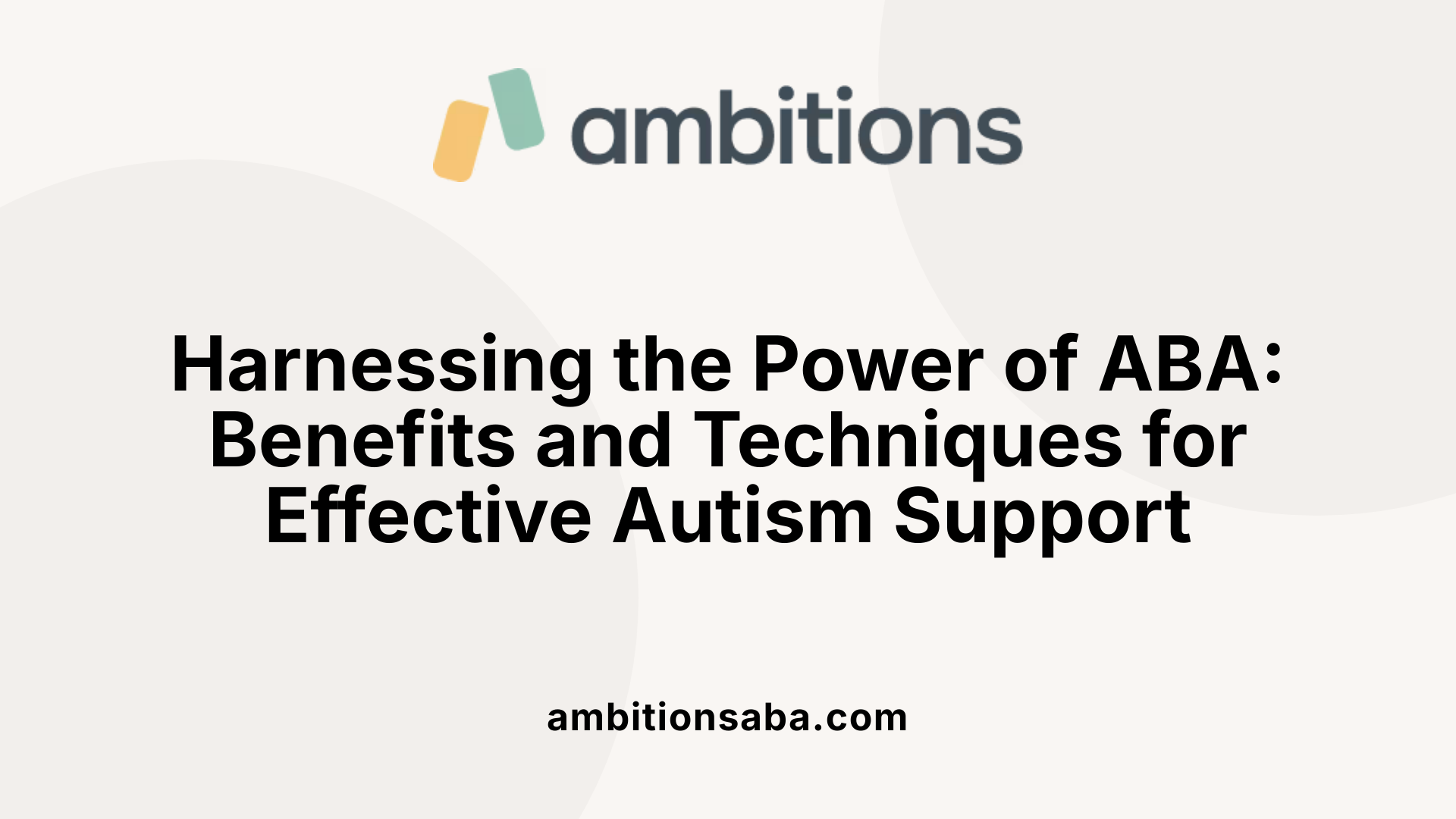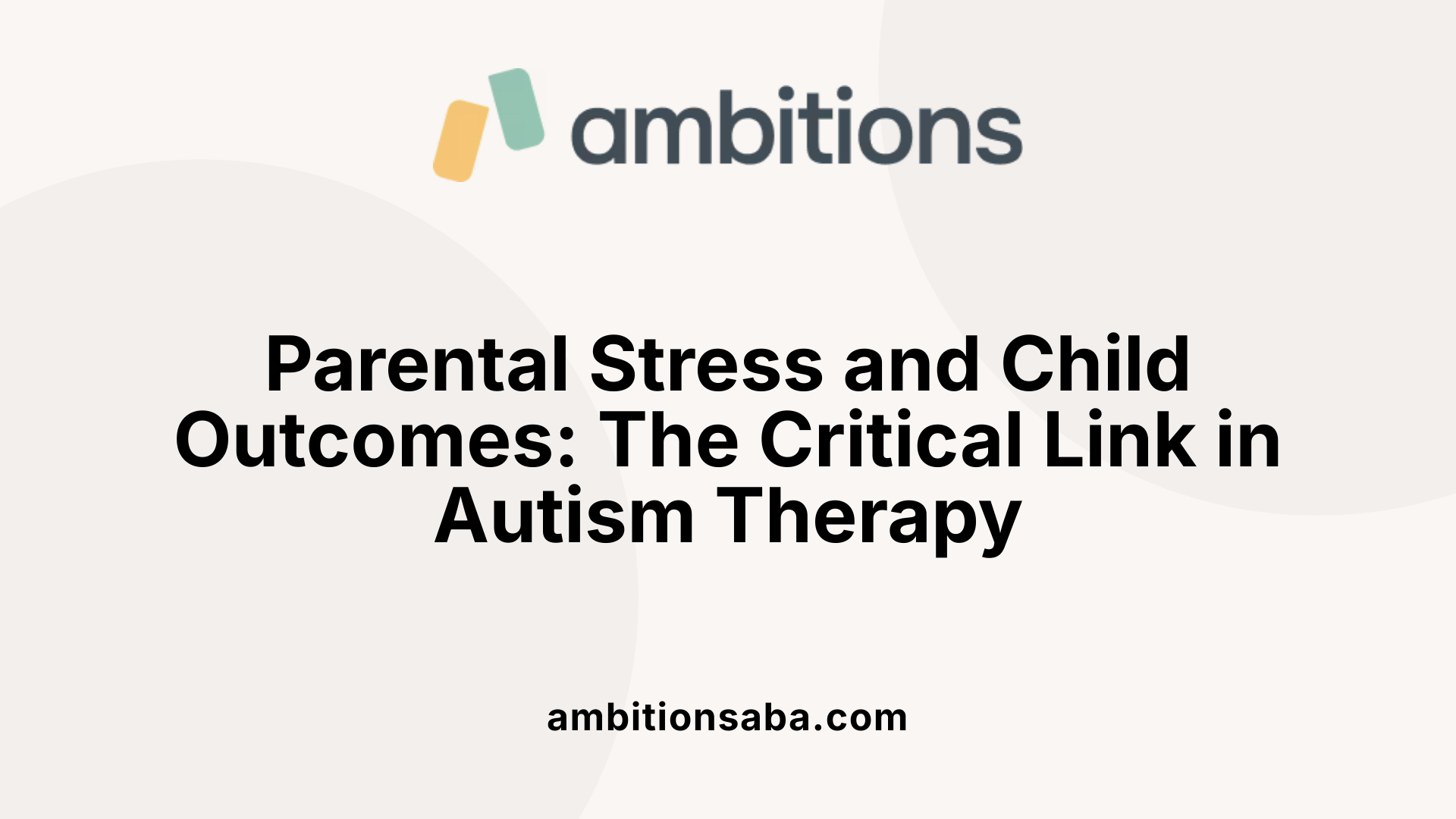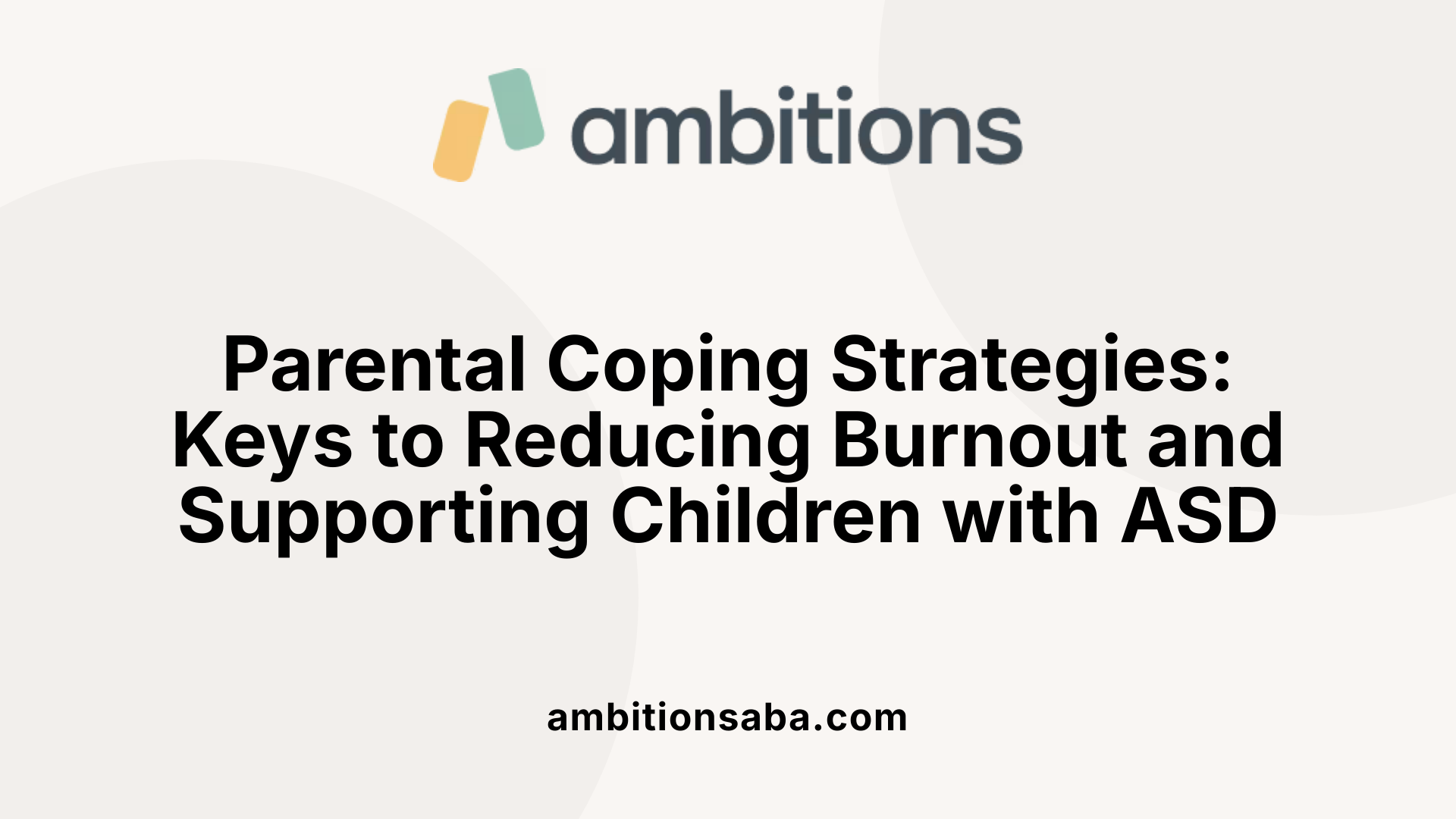Understanding the Emotional Toll on Parents
Parents of children with Autism Spectrum Disorder (ASD) often face unique and intense challenges that can lead to significant stress and burnout. As families engage in therapy programs such as Applied Behavior Analysis (ABA), understanding the dynamics of parental stress and effective coping mechanisms becomes essential. This article explores the causes and impacts of parental burnout within the context of autism therapy, the role of ABA, and strategies to foster resilience and well-being for parents and children alike.
What is ABA Therapy and Who Provides It?

How does parental stress affect mental health outcomes in children with ASD?
Parental stress notably influences the mental health of children with Autism Spectrum Disorder (ASD). Research shows that core autism-related parental stress, measured by tools like the Autism Parenting Stress Index (APSI), is significantly linked to affective problems such as anxiety and depression in children. This connection highlights how the emotional experiences of parents can affect their child's emotional well-being.
What methods are used to study the interactions between parental factors and child symptoms?
Advanced network modeling techniques, including the Multivariate Gaussian Model (MGM) and gLASSO regularization, are employed to analyze these relationships. These sophisticated statistical approaches help map the complex interactions between parental stress, coping strategies, and behavioral symptoms exhibited by children with ASD, providing detailed insights into how these variables influence each other.
What links exist between child behavioral problems and parental coping?
Conduct problems in children, such as oppositional defiant behaviors, have been found to be strongly interconnected. The network analysis also reveals that adaptive coping strategies used by parents, like problem-solving and positive reframing, occupy central roles in the network. This suggests these strategies act as protective factors, mitigating negative outcomes. In contrast, maladaptive coping mechanisms show negative influence, indicating limited benefits.
What interventions can help reduce parental stress and improve child outcomes?
Interventions focusing on developing emotional regulation skills, such as Cognitive Behavioral Therapy (CBT) and mindfulness practices, are effective. Additionally, training parents in adaptive coping methods enhances their ability to manage stress. Regular monitoring of parental stress using ASD-specific assessments like the APSI can help tailor intervention efforts. Structured stress-management workshops for parents, offered in clinical and school settings, also contribute to improvements in children’s emotional and behavioral health.
How should clinicians approach treatment considering these findings?
Clinicians are encouraged to use a network perspective to identify key symptoms and parental coping behaviors. Targeting these critical nodes can improve therapeutic outcomes by focusing on the most influential factors affecting both parents and children. This approach facilitates more precise and effective interventions, offering hope for better managing ASD-related challenges within families.
Benefits and Techniques of ABA Therapy

How does parental stress affect children with Autism Spectrum Disorder?
Parental stress, especially stress specifically linked to autism-related challenges, deeply influences mental health outcomes in children with Autism Spectrum Disorder (ASD). High levels of core autism-related parental stress, measured with tools like the Autism Parent Stress Index (APSI), are strongly associated with children's affective problems, such as anxiety and mood difficulties.
What does the network analysis reveal about child behavioral symptoms?
Using sophisticated network modeling techniques like the Multivariate Gaussian Model (MGM) with gLASSO regularization, researchers mapped relationships across parental factors and child symptoms. This modeling shows that conduct problems in children align closely with oppositional defiant behaviors, highlighting interconnected behavior challenges that may benefit from targeted interventions.
Which parental coping strategies are most protective?
The network analysis highlights adaptive coping strategies—such as problem-solving and positive reframing—as central protective factors. These coping methods have high centrality measures, indicating they play a pivotal role in mitigating the intensity of symptoms in children. Conversely, maladaptive coping strategies tend to have negative centrality, suggesting they offer limited or even detrimental protective effects.
How can interventions be tailored based on these findings?
Interventions that focus on bolstering parental emotional regulation skills, including cognitive behavioral therapy (CBT) and mindfulness training, show promise. Teaching parents adaptive coping approaches and offering structured stress-management workshops in clinical or school settings can improve both parental well-being and children's emotional and behavioral health.
How can clinical practice benefit from a network perspective?
Clinicians are encouraged to adopt a network perspective when planning treatment. This involves assessing parental stress with ASD-specific tools like APSI and mapping symptom and coping networks to identify and prioritize influential nodes. Targeting both parental stress and coping strategies alongside child symptoms can enhance therapeutic outcomes significantly.
Linking Parental Stress to Child Outcomes in Autism Therapy

How does parental stress relate to child symptoms in Autism Spectrum Disorder (ASD)?
Parental stress, especially stress directly linked to autism-specific challenges, plays a significant role in shaping mental health outcomes for children with ASD. Research utilizing advanced network modeling techniques, such as the Multivariate Gaussian Model (MGM) and gLASSO regularization, highlights strong associations between parental stress and affective problems in children. For example, heightened core autism-related parental stress correlates with increased emotional difficulties in children. Additionally, behavioral issues like conduct problems are closely connected to oppositional defiant behaviors, emphasizing the complex interplay between parental experience and child symptomatology.
Why is assessing parental stress important in autism therapy?
Regular and targeted assessment of parental stress is vital for designing effective interventions. Utilizing ASD-specific measurement tools, such as the Autism Parenting Stress Index (APSI), enables clinicians to accurately capture the unique stressors parents face. Understanding these stress profiles helps inform tailored therapeutic plans that address both parental well-being and child outcomes. Parent-focused stress-management programs—including structured workshops in clinical or school settings—have been shown to reduce parental stress and consequently improve children's emotional and behavioral health.
What does core autism-related stress measurement involve?
The Autism Parenting Stress Index (APSI) specifically measures parental stress related to the autism condition, focusing on areas such as communication difficulties, social challenges, and repetitive behaviors. This precise measure has demonstrated significant associations with children's affective problems, making it an essential tool in evaluating and guiding interventions. The APSI assists clinicians in identifying critical stress factors and tracking changes over time, ensuring that parent and child needs are both addressed effectively within autism therapy.
Coping Strategies to Mitigate Parental Burnout

What Types of Coping Strategies Do Parents Use?
Parents of children with Autism Spectrum Disorder (ASD) often face high stress levels, but the way they cope can significantly affect both their well-being and their child's mental health outcomes. Network analysis reveals that adaptive coping strategies such as problem-solving and positive reframing occupy a central role in managing stress effectively. These strategies demonstrate protective effects by helping parents handle daily challenges constructively. In contrast, maladaptive coping strategies—like avoidance or denial—show negative centrality measures, indicating that they are less effective and may not buffer stress well.
How Can Emotional Regulation Interventions Help?
Interventions that enhance emotional regulation are particularly beneficial. Approaches like Cognitive Behavioral Therapy (CBT) and mindfulness training empower parents to manage their emotional responses more skillfully. These techniques reduce parental burnout by fostering awareness and control over stress reactions, which in turn promotes a healthier family environment. By improving parents' emotional regulation, children with ASD also benefit, experiencing fewer affective and conduct issues.
What Role Do Parent-Focused Stress-Management Programs Play?
Structured stress-management workshops provided in clinical or school settings offer practical support to parents. These programs teach adaptive coping methods, including relaxation techniques and problem-solving skills. Regular assessment tools such as the Autism Parenting Stress Index (APSI) facilitate monitoring parental stress levels to tailor interventions effectively. Implementing these programs contributes positively to the emotional and behavioral health of children by empowering their caregivers.
Monitoring Progress and Maintaining Resilience During Therapy

How is progress measured during ABA therapy?
Progress in Applied Behavior Analysis (ABA) therapy is meticulously tracked through systematic data collection methods. Techniques such as frequency counts, interval recordings, and event recordings capture the occurrence and duration of targeted behaviors. This rich data is then visualized with charts and graphs, allowing therapists and caregivers to observe trends over time clearly.
Evaluating this collected data helps professionals assess whether interventions are meeting their goals. It also informs necessary adjustments to therapy plans, making the process dynamic and personalized. Caregivers are engaged through these visual tools, which empower them to consistently reinforce skills in daily environments.
Benefits of ongoing data collection
Continuous data gathering provides a robust foundation for informed decisions throughout therapy. It establishes a feedback loop where each session’s progress guides subsequent steps. This methodology supports early identification of challenges or plateaus, allowing timely intervention modifications.
Moreover, ongoing collection fosters transparency among all parties involved—therapists, parents, and educators. This collaborative approach promotes consistency and maximizes the potential for positive outcomes, enhancing the client’s acquisition of new skills and reduction in problematic behaviors.
Importance of a network perspective in therapy
Adopting a network perspective enriches therapy by recognizing complex interrelations between behaviors and influencing factors. Specifically, integrating parental stress and coping strategies into assessments allows clinicians to pinpoint pivotal nodes affecting the child’s progress.
For instance, targeting parental adaptive coping methods or addressing affective problems in the child could have cascading positive effects across the behavioral network. This comprehensive strategy enhances therapeutic outcomes by addressing not only isolated behaviors but also underlying dynamics that sustain or disrupt progress.
Supporting Parents Through the Autism Therapy Journey
Parental burnout is a significant concern in the context of autism therapy but can be effectively addressed through understanding stress dynamics and applying targeted support strategies. ABA therapy offers proven benefits for children with ASD, facilitated by a collaborative team and personalized interventions. Importantly, the mental health of parents profoundly affects child outcomes, making coping strategies and stress management essential components of treatment planning. Through adaptive coping mechanisms, parent-focused programs, and continuous therapeutic progress monitoring, families can navigate the challenges of autism therapy with greater resilience and hope for positive developmental gains.
References
- Parental Stress and Coping in Autism Spectrum Disorder ...
- ABA Techniques: Strategies for Behavior Analysts - GSEP Blog
- Applied Behavior Analysis (ABA)
- ABA Therapy Examples, Definition & Techniques
- Applied Behavior Analysis (ABA)
- Applied Behavior Analysis (ABA)
- What Is Applied Behavior Analysis (ABA)?
- Applied Behavior Analysis (ABA)
- Applied Behavior Analysis (ABA)



